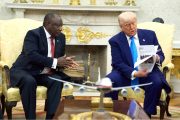The new Libyan regime is reportedly refusing to hand over Gadhafi’s son Saif al-Islam and ex-“Intelligence Minister” Abdullah al-Senussi to the “International Criminal Court” in the Hague for prosecution, promising that they will receive a fair trial in national courts instead. But the ICC has not given up yet as its chief prosecutor arrived in Tripoli for discussions with the new government on November 22.
The self-styled international court of universal jurisdiction issued arrest warrants for both men and the late tyrant this summer following months of civil war. But the elder Gadhafi was brutally killed by rebel forces after his convoy was struck by Western warplanes. Most of his other children and even some of his grandchildren were killed by NATO bombs during the regime change operation.
The younger Gadhafi and heir-apparent Saif al-Islam — who just weeks ago vowed to die fighting — was captured over the weekend by militiamen in the southern desert, supposedly on his way across the border to Niger (if his captors are to be believed). The former regime’s spy boss was caught shortly after that. Both are currently being held prisoner by militia forces.
While the ICC and most Western governments claim Libya’s new rulers must hand over the duo to “international authorities,” Libyan officials are holding firm. Various interim “ministers” said the two should be tried in their homelands. Plus, the new government — like the United States — has not signed on to any purported world-court agreement.
“We are ready to prosecute. We have adopted enough legal and judicial procedures to ensure a fair trial for him,” said interim “Justice Minister” Mohammed al-Alagy. “The Libyan judicial system is capable of prosecuting people of Saif’s stature. The important thing is to ensure a fair trial. We have been preparing for this for months.”
Other than the Obama administration, most of the foreign governments that helped overthrow the Gadhafi regime are weary of letting the rulers they installed handle the trial, claiming to be concerned about fairness and humane treatment. The ICC appears to be particularly reluctant to let the Libyans handle their own affairs.
“The issue of where the trials will be held has to be resolved through consultations with the Court,” claimed Luis Moreno-Ocampo (pictured above), the chief prosecutor for the purported global judiciary. “In the end, the ICC judges will decide, there are legal standards which will have to be adhered to.”
While he celebrated the arrest of Saif al-Islam and al-Senussi and demanded that they face justice, Moreno-Ocampo said he would continue discussions with the new Libyan regime. “I will talk to the national authorities and seek information about proposed national proceedings in order to assist us in analyzing the admissibility of the case against Saif Gadhafi and Abdullah al-Senussi and to understand their plans moving ahead,” he said in a statement.
Some Western “experts” claim the Libyan regime is not competent enough to handle a complex trial and that the new rulers have an obligation to hand him over. One excuse is that, after 40 years of Gadhafi’s maniacal rule, the nation does not have enough experience with proper legal proceedings.
Ironically, the chairman of the NATO-backed National Transitional Council (NTC) now ruling Libya, Mustafa Abdul Jalil, was Gadhafi’s “Justice Minister” until this year. As the civil war was raging Western leaders were telling their populations what a great and trustworthy man he was. Today, however, many European leaders have changed their tones — at least when it comes to confidence in the high-profile trials.
“I would like to see [Saif al-Islam] tried to international standards, whether that be in Libya or in the Hague. That is the important thing,” noted British Foreign Secretary William Hague in an interview with BBC Radio. “The details of that have to be sorted out between the ICC and the transitional government.”
Hague claimed that ICC rules would allow the new Libyan regime to try members of the old regime — assuming the world court agrees to permit it. The new rulers can also feel free to try the duo for crimes committed before the ICC “indictment,” he claimed.
Meanwhile, human rights groups including Amnesty International and Human Rights Watch also expressed concern that Saif might not receive a fair trial. The organizations said the pair could face execution in Libya, too, a potential sentence that would be unavailable to the ICC.
But Libyan “Information Minister” Mahmoud Shammam said his regime would not permit international authorities to take custody of the accused. “The ICC is just a secondary court, and the people of Libya will not allow Saif to be tried outside,” he said.
Libyan charges against the pair are expected to include instigating killings and misusing public money. The ICC, meanwhile, is pursuing a “crimes against humanity” prosecution.
But it may all be a moot point — Saif al-Islam is being held by the Zintan militia, which so far has resisted handing him over to the Western-backed regime in Tripoli. ”We can try him,” the chief of the Zintan Council was quoted as saying. “It will not take too long; we don’t need new laws.”
Analysts noted that a real public trial could prove to be a huge embarrassment for Western officials that were cooperating closely with the Gadhafi regime in recent years. The U.S. government, especially, was a close terror-war ally of the dictator and was even sending prisoners to Gadhafi to be tortured. Former British Prime Minister Tony Blair was also particularly close to the regime, as were other elites in the United Kingdom.
But the ICC is expected to do everything in its power to conduct the trials itself, according to experts. If it was unable to take charge, the budding global court would appear impotent to observers.
“It will cause a major uproar among UN member states because it amounts to a breach of the UN resolution, and it will lead to anger among human rights organizations,” Dutch lawyer and international law expert Geert-Jan Knoops was quoted as saying. “The worst example was the trial of Saddam Hussein in Baghdad. That was really a sham trial.”
If Saif al-Islam is eventually handed over to the emerging regime in Tripoli, but the new rulers still refuse to hand him over to self-styled international authorities, the ICC will at least try control the trial, Knoops explained. Using ICC judges in Libya, for example, would be one option.
Meanwhile, the international court claims to also be investigating war crimes committed by NATO and rebel forces. “There are allegations of crimes committed by NATO forces, allegations of crimes committed by NTC-related forces, including the alleged detention of civilians suspected to be mercenaries and the alleged killing of detained combatants, as well as allegations of additional crimes committed by pro-Gadhafi forces,” prosecutor Moreno-Ocampo told the UN Security Council early this month. “These allegations will be examined impartially and independently by the Office [sic].”
But no matter how evil or guilty somebody being prosecuted by the ICC may be, critics say the so-called “court” is an illegitimate “fraud” that should be promptly dismantled. As senior editor William Jasper noted in an article for The New American as the body was coming into existence, “…if the ICC architects have their way, the entire planet will soon become a global insane asylum — with the inmates in charge.”
Related articles:
Libya: Now What?
Brief History of Gadhafi & His Regime
Gadhafi’s Gold-money Plan Would Have Devastated Dollar
NATO, Rebels Investigated by ICC for War Crimes in Libya
Photo: ICC prosecutor Luis Moreno Ocampo is accompanied by Libyan Interim Justice Minister Mohammed al-Alagi (out of picture) as he arrives in Tripoli, Libya, Nov.22, 2011: AP Images




